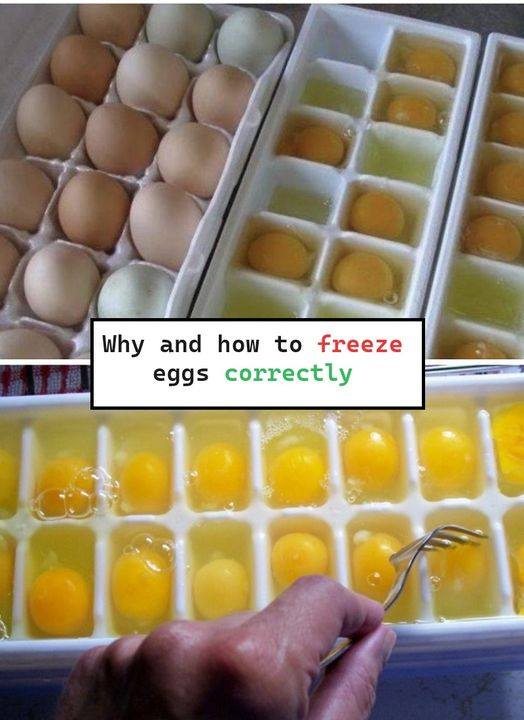ADVERTISEMENT
- Whole Eggs: Pour a mixture of eggs into ice cube trays, muffin tins, or silicone molds. This allows you to freeze eggs in single-serving portions for easy thawing. Typically, one whole egg equals about 1/4 cup (or 4 tablespoons).
- Egg Whites: Pour individual egg whites into ice cube trays or small containers. Each egg white is roughly 2 tablespoons (about 1/8 cup).
- Egg Yolks: Pour individual yolks into ice cube trays or small containers as well. A single egg yolk is around 1 tablespoon.
Step 3: Freeze the Eggs
Once your eggs are portioned, place the tray or containers in the freezer and let them freeze solid for about 2-3 hours. This prevents them from sticking together when transferred to storage bags or containers.
Step 4: Transfer to Storage Containers
After the eggs are fully frozen, transfer them from the ice cube tray or mold into freezer-safe storage bags or airtight containers. Label the containers with the type of egg (whole, yolk, or white) and the date so you can keep track of their freshness.
- For whole eggs, make sure the bag or container is labeled with the number of eggs inside, so you know how much you’re using for recipes later.
- For egg whites and egg yolks, you can either store them individually or in bulk portions (for example, 4 egg whites or 4 yolks in one bag).
Step 5: Seal and Store
Seal the bags or containers tightly to prevent freezer burn and store the eggs in the freezer. They can be stored for up to 1 year but are best used within 6 months for optimal freshness and quality.
How to Thaw and Use Frozen Eggs
Now that you’ve frozen your eggs, you need to know how to thaw and use them correctly.
Thawing Frozen Eggs
- Whole Eggs: To thaw whole eggs, simply remove them from the freezer and place them in the refrigerator overnight or for at least a few hours. Once thawed, they can be used just like fresh eggs in any recipe.
- Egg Whites and Yolks: Egg whites and yolks can be thawed in the fridge as well, but if you’re in a hurry, you can thaw them in a bowl of warm water for 10-15 minutes. Once thawed, give the yolks a quick stir to loosen up any texture that may have thickened during freezing.
Using Frozen Eggs
Frozen eggs work best for cooking and baking. Here’s how they perform:
- Baking: Frozen eggs work beautifully in baked goods like cakes, cookies, and muffins. Simply use the thawed eggs as you would fresh eggs in the recipe.
- Cooking: For scrambled eggs, omelets, or other dishes where you need whole eggs, thawed frozen eggs can be used just like fresh eggs. However, the texture might be slightly different for some preparations (e.g., hard-boiled eggs) because of the freezing process, so they’re best suited for recipes where eggs are beaten or scrambled.
Tips for Freezing Eggs
- Add a Pinch of Salt or Sugar: To prevent yolks from becoming too thick when frozen, add a pinch of salt (if using for savory dishes) or sugar (if using for sweet dishes) before freezing. This will help preserve their consistency.
- Don’t Freeze Eggs in Their Shells: Never freeze eggs in their shells, as the liquid inside will expand when frozen and could crack the shell. Always crack the eggs open first before freezing.
- Label Everything: Be sure to label your containers with the date and number of eggs so you can easily track their freshness.
- Don’t Refreeze: Once you thaw frozen eggs, don’t refreeze them. Use them up within a few days after thawing.
Conclusion: Freezing Eggs for Convenience and Savings
Freezing eggs is a smart, cost-effective way to store eggs for later use, especially when you have a surplus or find a great deal. By following the steps outlined above, you can ensure that your frozen eggs maintain their quality and texture, ready to be used in cooking and baking whenever you need them.
Whether you’re a busy housewife, a meal prep enthusiast, or someone just looking to extend the life of your eggs, freezing them correctly is an excellent way to save time, reduce waste, and make the most of your kitchen staples. So, the next time you find yourself with too many eggs, don’t let them go to waste—freeze them for later and enjoy fresh eggs all year round!
ADVERTISEMENT
